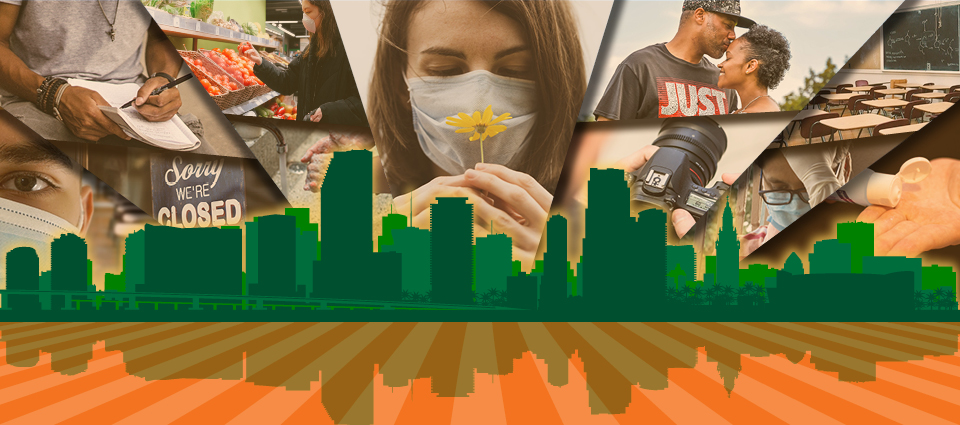(En español)
What should I be documenting?
What you document about your experiences is up to you, but if you can’t think of how to get started, here are some questions that may aid you in forming your own narrative:
- Who is with you while you are social distancing during COVID-19 (family, partner, pets?) Have your relationships changed?
- How do you access essentials like food, water, medical supplies, masks, etc.?
- How do you spend your time? (e.g. entertainment, walks)
- How has your education and/or work been impacted by COVID-19?
- What do you want to remember about this time a year from now?
- Have any big life changes occurred for you during this pandemic? (e.g. birth of a child, new job, marriage, death in the family, etc.?)
- How has the pandemic impacted organizing, activism, and social justice struggles?
Who can participate in this project?
We welcome submissions from all of our South Florida community (defined as Palm Beach, Broward, Miami-Dade, and Monroe counties), including University of Miami students, faculty, and staff no matter where they presently reside. For those under the age of 18, we require parents or guardians to complete the submission form for you. We are interested in archiving many and varied experiences and perspectives.
How do I submit to the project?
You can digitally submit your files to us by using the submission form. You will be asked to fill out an agreement with the University of Miami Libraries on the form, allowing us to serve as a repository and preserve your materials, and you will also be provided with important information regarding copyright, privacy, reproduction, and sharing of your materials. We also ask that all participants limit digital submissions to a maximum of 15 files, with individual files under 50MB in size. If you have more than 15 files, or file sizes over 50MB to donate, please reach out to us at covid19.archive@miami.edu to discuss the donation.
What kinds of materials do you accept?
We will only accept digital content using the following file formats: png, gif, jpg, jpeg, pdf, doc, docx, txt, mp3, mp4.
Some examples of materials you can send in analog/physical and digital formats are as follows:
- articles and news clippings
- artwork
- audio recordings
- blog posts or vlogs
- brochures
- diaries
- ephemera
- essays
- interviews
- journals
- oral histories
- pamphlets
- photographs
- poetry
- prose
- reports
- short stories
- videos
- zines
Physical donations will be accepted at a later date. The UM Libraries will make an announcement on the project page once the Distinctive Collections are ready to accept analog or physical donations.
Gifts will become the property of the University of Miami upon receipt, and the UML may make all necessary decisions as to their retention, location, cataloging treatment, and other considerations relating to their use and disposition.
When is the deadline for submitting materials?
This project is ongoing and has no definitive deadline. Should this change, we will notify you on this page.
1 https://www.miamiherald.com/news/coronavirus/article242642256.html
2 Department of Health, Division of Disease Control and Health Protection: Florida’s COVID-19 Data and Surveillance Dashboard, accessed March 18, 2021
Now Accepting Submissions
You can digitally submit your files to us by using the University of Miami Libraries Distinctive Collections Documenting COVID-19 submission form.
(Puede enviarnos sus archivos digitalmente utilizando el formulario de envío del proyecto.)
If you have more than 15 files, or file sizes over 50MB to donate, please reach out to us at covid19.archive@miami.edu to discuss the donation.
Contact Us
Please send all questions and concerns to the following e-mail address: covid19.archive@miami.edu, or contact us at the Kislak Center main number 305-284-9552 between the hours of 9:00 AM and 4:00 PM. Phone messages are currently being checked twice a day, so expect some delays in us getting back to you.
Distinctive Collections
